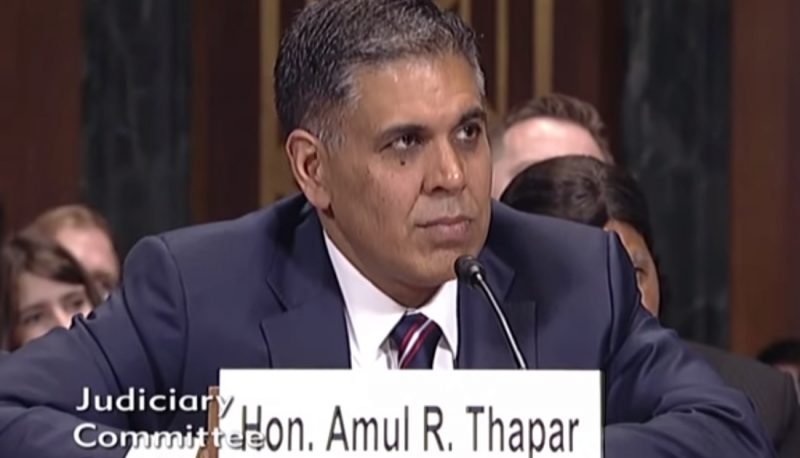“Confirmed Judges, Confirmed Fears” is a blog series documenting the harmful impact of President Trump’s judges on Americans’ rights and liberties. Cases in the series can be found by issue and by judge at this link.
Trump Sixth Circuit judge Amul Thapar argued in dissent that the court should stay and ultimately reverse a permanent injunction against a restrictive Tennessee abortion law that was ordered after an extensive trial by a district judge nominated by President Reagan. The majority rejected Thapar’s argument and denied a stay of the injunction pending appeal in its February 2021 decision in Bristol Regional Womens Center v Slatery.
In 2015, Tennessee enacted an abortion law that requires that all women seeking an abortion must receive specified information about the procedure in person from a physician and then wait 48 hours and then sign a consent form before having an abortion, even if it is by oral medication. The result is to require “all women seeking an abortion” in the state to “make at least two trips” to the place they will receive care. Several clinics and doctors challenged the law, on behalf of themselves and their patients, contending that it imposes an “undue burden” on women seeking an abortion. In some cases, witnesses later testified, the delay “pushed women beyond the time when they could have medication abortions” or even any abortion “altogether.”
After five years of litigation and a four-day trial, Judge Bernard Friedman, who was nominated by President Reagan, issued a comprehensive opinion of more than 135 pages in which he struck down the law and permanently enjoined its enforcement. The state immediately appealed and asked the Sixth Circuit to stay the decision and allow it to continue to enforce the law as the appeal went forward.
In a 2-1 decision, Judge Karen Nelson Moore, joined by Judge Helene White who was nominated by President George W Bush, denied the state’s motion. The majority explained that a party seeking a stay “bears the burden” of showing that it should be issued, but the state had clearly failed to do so. They noted that the state had “not so much as attempted” to challenge the district court’s factual findings, which included the determination that the waiting period “burdens the majority” of women seeking an abortion with “significant, and often insurmountable, logistical and financial hurdles.” The majority pointed out that because of the small number of clinics providing abortions in the state, distance, and other factors, the district court found that delays were typically “significantly longer” than the 48 hours mandated in the law, and that the statute was thus “responsible for the increase in medically-riskier second trimester abortions” in the state after its passage. Although the majority acknowledged that there has been recent controversy about precisely how to interpret the “undue burden” standard of the Supreme Court’s Casey decision in recent Court rulings, it concluded that the district court’s findings “likely satisfy either of the available articulations” of the Casey standard, so that the law probably does impose an undue burden on women seeking abortion care, and the state had not met its burden to show otherwise.
Trump judge Thapar dissented. He claimed that the majority had chosen to “ignore precedent” because the Supreme Court had upheld a 24-hour waiting period in Casey. Thapar also argued that the Sixth Circuit had recently ruled that determining whether a law imposes an “undue burden” on women seeking abortions under Casey does not involve balancing any burdens against a law’s benefits, while the district court had used such a balancing test as suggested by four justices in the June Medical case. According to Thapar, the state is “likely to prevail on the merits” of the appeal and is thus “entitled to a stay” of the injunction, while the majority had “functionally overruled Casey” and was improperly substituting its “own preferences” for the Supreme Court’s ruling. Thapar even argued that the failure to grant a stay was so egregiously wrong that the ruling “merits immediate correction by our court or a higher one.”
The majority clearly demonstrated what was wrong with Thapar’s arguments. They explained that the dissent “dramatically overstates” Casey, which “took pains to avoid a categorical ruling on the constitutionality of waiting period laws,” and instead made clear that its decision was based on “the record” in the district court in that case, which the majority noted was very different than the record in this case. The majority also noted that the district court’s ruling that used the “balancing test” was issued before the Sixth Circuit decision rejecting that version of the “undue burden” standard, and that reversal was not warranted since, as the majority had written, the district court’s factual findings would render the law unconstitutional under either version of that standard. As to Thapar’s claim that the full court should reconsider the stay decision, the majority noted that he had failed to cite “a single case” where the full court had reviewed a “pre-merits stay order,” and that the court’s own internal operating procedures “preclude such a wasteful result.” Thapar’s argument was clearly part of what the majority characterized as his “zeal to uphold what appears to be yet another unnecessary, unjustified, and unduly burdensome state law that stands between women and their right to an abortion.”
The Tennessee case, of course, is far from over. Given the large number of Trump judges and justices who firmly oppose a woman’s right to choose and support any measure to restrict it, there is serious concern about the ultimate outcome of the case, notwithstanding the compelling district court record. Despite Thapar’s efforts, however, the injunction against the state’s burdensome waiting period law stands for now.

